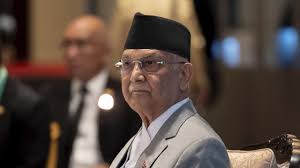
Prime Minister KP Sharma Oli has resigned amid a wave of violent unrest that has gripped Nepal, marking the country’s most severe political crisis in decades. His decision, announced Tuesday, follows the deaths of 19 protesters in clashes with police the day before, and comes as demonstrators continue to rage against corruption and government overreach.
Oli, a four-time prime minister and leader of the Communist Party, said his resignation was intended to “facilitate the solution to the problem and help resolve it politically in accordance with the constitution.” President Ramchandra Paudel has accepted the resignation and initiated discussions to identify a successor, though the leadership vacuum has left the nation in a state of uncertainty.

The protests, largely led by young Nepalis, erupted after the government imposed a sweeping ban on 26 social media platforms, including Facebook and Instagram, citing concerns over misinformation and online fraud. Although the ban was lifted late Monday, the damage had already been done fueling a mass movement that quickly escalated into violent confrontations and widespread destruction.
On Tuesday, demonstrators stormed parliament in Kathmandu, setting the building ablaze and dancing around fires while waving national flags. Government offices and homes of political leaders, including Oli’s own residence, were attacked and torched. Three additional deaths were reported, and in the chaos, 900 inmates escaped from two western prisons.

The protests appear to be spontaneous, with no centralized leadership, but they have coalesced around a powerful anti-corruption message. A viral “nepo kid” campaign on social media highlighting the extravagant lifestyles of politicians’ children helped galvanize public anger in the lead-up to the unrest.
Nepal’s army chief issued a warning late Tuesday, stating that all security institutions, including the military, were prepared to take control of the situation if violence persisted. Meanwhile, several ministers have reportedly sought refuge with security forces, and curfews remain in effect across multiple districts.
Despite the prime minister’s resignation, protesters show no signs of backing down. Kathmandu resident Muna Shreshta, 20, voiced the sentiments of many, saying, “It is high time our nation, our prime minister, and anyone in power changes… I hope this change will bring something that is positive to us.”
With the political elite under siege and no clear roadmap ahead, Nepal stands at a pivotal moment caught between a youth-led demand for reform and the remnants of a shaken establishment.



